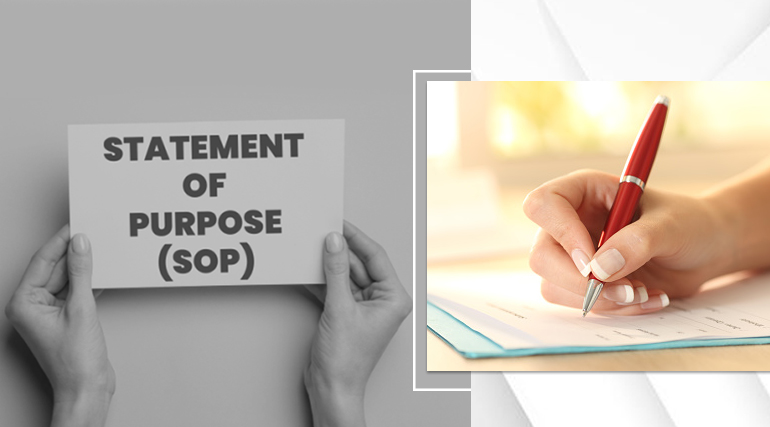What happens if my purpose statement isn't strong enough? What happens if my writing isn't good enough? How come my SOP is so typical?
Nearly all students who are preparing a Statement of Purpose for their college applications have these questions on their minds. We're going to provide you with some basic pointers on how to create a Statement of Purpose and what not to do to assist you in producing a killer SOP! We don't blame you for being anxious at this point. Your college application will either succeed or fail based on your SOP. It is essential to support your skills and have complete confidence in your writing style to lessen the tension.
Statement of Purpose (SOP) format:
Although at first it could seem like a very daunting undertaking, creating your Statement of Purpose won't appear that way after you get started.
The most frequent issue that most students run into is having to change their SOP once it has been written. If you adhere to these SOP format recommendations, you may save yourself a great deal of hassle:
- Write your Statement of Purpose (SOP) in paragraph form, no more than one to one and a half pages (1,500–2,000 words).
- Ensure that the program you wish to apply for and your complete name are mentioned at the top of the page.
- Use a Times New Roman font (12 points) with 1-inch margins on both sides to ensure that your SOP is the simplest to read.
- Pay attention to your language usage, grammar, and punctuation. Take extra precautions.
- When writing your SOP, try to have a casual, yet welcoming tone.
- The structure and word count of the SOP differ for every university.
SOP writing tips:
What distinguishes you from any other applicant for the same position is your statement of purpose. Therefore, you must establish a strong and compelling Statement of Purpose. Here are some pointers to get you started:
1. Verify that it is organized.
Although there isn't a set sequence for developing SOPs, it's best to have some sort of structure to ensure that your document is easy to understand. Provide a brief introduction, including information about your background and experiences, as well as program and career data.
2. Show off your writing abilities
Your SOP, in addition to your TOEFL or IELTS scores, is a clear indicator of your proficiency in the English language. Therefore, take care to avoid making any grammatical errors, use appropriate terminology, and have the SOP checked by someone else.
3. Tips for drafting a SOP
The Admissions Officer will have certain questions that he wants answered after reading your SOP. The best course of action is to make sure that your SOP addresses each of them in its writing. Among them are the following: What are your hobbies and who you are as a person? What draws you to their university as a student, and why? What made you decide on your area of study? What makes you the best applicant for that university? What sets you apart from the other applicants?
4. Research and research; Never copy!
Copying a template or example SOP from the web and using it exactly is one of the most damaging actions you could do while building your own SOP. The SOP is what sets it apart from the competition and persuades the institution to accept you.
Investigate the SOP writing structure, but always remember to include your unique wording in the Statement of Purpose (SOP).
What NOT to write in your Statement of Purpose
Naturally, there are some standards that the institution has when it requests that you submit a Statement of Purpose or an essay with your application. Most of the time, they only specify a format for SOP authoring. While some could offer detailed guidelines for writing.
There are a few unstated guidelines that you should bear in mind when drafting your SOP, even if you must undoubtedly go by the institution's standards. To alleviate the burden of drafting your SOP and prevent errors, here are some pointers on the top 5 things to avoid:
1) Glamorizing and Boasting
Make sure that your assurance doesn't come off as haughtiness. You must understand the fine line that separates informational bragging. Your essay needs to demonstrate your level of confidence. Remember that bragging about your accomplishments betrays a lot of insecurity. Additionally, boasting about your accomplishments conveys a sense of vanity and self-importance. You do not want a selection committee to perceive you in this way.
2) Avoiding confrontation
The one characteristic that every single member of the selection committee hates the most about candidates is their lack of focus. Many candidates focus so much on the minutiae that they neglect to provide a compelling argument that draws the reader in. Make a list of the events and accomplishments you wish to discuss in your outline, and then organize your essay accordingly. Continue revising the article until you believe the SOP is clear and ready for delivery.
3) Inconsistency
Make sure your SOP doesn't contain any unclear statements. When pupils attempt to portray and shape a picture of themselves instead of exhibiting who they are, this is the one thing that results. For instance, your CV makes no mention of your participation in sports, even if your SOP says that you're an avid sportsman. Such strategies will provide the committee with conflicting and confused messages.
4) A poor start
The overall tone of the piece is established by a compelling opening. The SOP is ineffective if the introduction fails to capture the reader's interest. Make sure your introduction is compelling by making a connection between your academic aspirations and personal history. Refrain from giving unrelated background information and from stating your future objectives in vague terms.
5) Drafting a SOP at the Last Minute
Make sure to begin drafting your SOP at least one month in advance of submission. A hastily composed SOP may easily be distinguished from those that are interesting and well-thought-out. Consequently, crafting a strong Statement of Purpose requires consistent practice; well-written SOPs emerge from days of reflection and labor. As a result, it is suggested that you write clearly and carefully follow the SOP. Avoiding errors such as the ones listed above is essential if you want your SOP to be unique from the others.
Our final advice
In summary, it's been said before and it will be said again: your statement of purpose has the power to make or destroy your prospects of being accepted into the institution of your dreams. Thus, be sure to heed all of the advice and recommendations provided above and create a fantastic SOP.
Also, you must have all of your supporting documentation, including your essay, SOP, letters of reference, etc., on hand before applying to any university.












